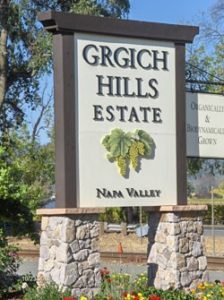 With the independent film Bottle Shock now available on DVD, more people might be tasting the wines produced by the winery featured in the film—Chateau Montelena. The story in the film surrounds the historic Paris Tasting of 1976 at which California wines surprisingly prevailed in a blind tasting with some of France’s top wines. The world of wine had changed forever, placing California on the premium wine map and spurring the development and appreciation new world wine regions in the following decades.
With the independent film Bottle Shock now available on DVD, more people might be tasting the wines produced by the winery featured in the film—Chateau Montelena. The story in the film surrounds the historic Paris Tasting of 1976 at which California wines surprisingly prevailed in a blind tasting with some of France’s top wines. The world of wine had changed forever, placing California on the premium wine map and spurring the development and appreciation new world wine regions in the following decades.
But savvy wine drinkers might also want to try Grgich Hills Estate Chardonnay. The winemaker in charge of making the winning wine from Chateau Montelana featured in the film—Mike Grgich—now produces outstanding Chardonnay at this winery of his own in the heart of Napa Valley California.
Grgich Hills Estate produces a couple Chardonnays that are premium quality and price, as well as other varieties. Fortunately, its estate-bottled Chardonnay is not outrageously expensive and well worth the price (about $40 dollars and occasionally less on sale). It is also pretty widely available in the D.C. area at wine shops, supermarkets, and Costco.
Grgich Chardonnay embodies a traditional French wine-making approach. The winery uses French, rather than American oak—which imparts less of the heavy vanilla tastes found in many California Chardonnays, but still includes a hint of oak. Grgich Hills Chardonnays also do not undergo malolactic fermentation. By forgoing malolactic fermentation, Grgich Chardonnay offers wonderfully crisp and fruity, citrus flavors that are particularly nice on a summer or spring day with your grilled chicken.
Bottleshock does not feature Mike Grgich, although his story as an immigrant escapee from then communist Yugoslavia to become a great American winemaker is as interesting and wonderful as his wines. Grgich’s story is beautifully told in George M. Tabor’s Judgment of Paris, California v. France and the Historic 1976 Paris Tasting that Revolutionized Wine.
Despite the absence of Grgich, the film is still worth watching. It includes a fictionalized version of the lives of the individuals involved in Chateau Montelena, offering both comic and dramatic insights to the lives of California winemakers in general during the 1970s. The acting is superb, particularly that of Alan Rickman (who also played Severus Snape in the Harry Potter films) as Steven Spurrier, a British owner of the French wine shop and school. Spurrier eventually set up the Paris tasting with the hope of opening the world to new developments in California. He had no expectation that the Californians would win. The film does a terrific job making its interpretation of Spurrier as a British snob who comes to California with very low expectations only to come up with some surprising finds.
The 1976 tasting composes a small part of the film. Only one news reporter showed up for the tasting, but he was a critically important one. George M. Tabor was a reporter for Time magazine, who had no idea what a huge scoop he had stumbled upon. Thanks to Tabor, the world learned about the tasting, the chagrin of the French who wanted to keep the results under cover. In addition, Stags Leap Cabernet Sauvignon won the prize for the red wine, trumping some of the world’s best blends from Bordeaux.
While the personal profiles may be largely fictional, the story reveals the rugged individualism and determination of California wine growing that certainly must have been a part and parcel of being in that business in that time in history. It is a portrait of a truly American approach to an age-old industry. California farmers and winemakers were charting a new course, employing trial and error, and unsuspectingly, on the verge of overtaking—or at least meeting—hundreds of years of French wine-making tradition. It is truly the story of an American Dream come true.
And many of those American’s were relative newcomers to this country like Grgich—whose real-life experiences are a non-fictionalized portrait of the American dream.